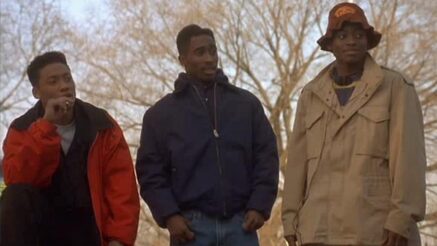B- | The lives of a quartet of NYC teens are upended after a robbery goes wrong. Directed by Ernest Dickerson Starring Omar Epps, Tupac Shakur, and Jermaine Hopkins Review by Jon Kissel |

However, Dickerson might’ve had a harder time raising his budget if the only stakes were a question of deejay success, so the film requires its rapper-turned-actor co-lead to become a psychopath and begin murdering his closest friends. Tupac plays Bishop, and in the aforementioned morning introduction, he’s warm with his grandmother and semi-comatose father, who we later learn spent a period of time in jail. He’s the target of bullying by a Puerto Rican gang led by a truly terrible Vincent Laresca. Both of these details paint him as a person capable of sensitivity in an insensitive environment, but he’s also a little too eager to join in on a neighborhood acquaintance’s daylight robbery. When the group decides they’re going to rob a convenience store, Bishop cruelly murders the terrified clerk and later murders childhood friend Raheem (Khalil Kain) in front of friends Q (Omar Epps) and Steel (Jermaine Hopkins). What was a coming-of-age film takes on the cadence of a monster movie and a gangster flick. While Dickerson and Shakur make Bishop into a chilling figure worthy of fear, there’s little that connects Bishop’s devolvement from a teen who would tenderly kiss his father goodbye to a villain who can hug the mother of the boy he killed and feel nothing.
It’s not like Dickerson couldn’t have made the two halves of his film gel together with some small changes. If the calmer first half put its characters in a poorer spot, the instigating incident of the stick-up might’ve made more sense. However, everyone appears to be doing perfectly fine within their means. If Juice just wants to put it all on teen bravado, something more meaningful than the Puerto Rican gang’s bullying needs to push them there. As is, four black teenagers who just suddenly decide to commit a felony isn’t a good look without some kind of motivation. In the back half, Bishop’s turning into a monster gives Tupac a lot to play with, but it’s again not credible nor is it the most interesting route that might’ve been taken. He has a living reminder in his apartment of the toll that jail can take on a person: why couldn’t he have just been desperate to avoid jail by any means necessary instead of actively malevolent for malevolence’s sake?
Even if his character is a mess, Tupac is quite good in Juice. He believably flips switches in his brain that transition him from threatening to accommodating, and he’s worthy of the fear that his former friends now feel around him. This is also Epps’ feature debut, and I’ve always felt he was an underrated actor who deserved a more extensive career than he’s had. He gets lost in the second half of the movie, but the first half that suggests it’s going to be about him and his aspiring deejay career provides him a chance to convey passion for a skill. The shot of the movie for me, closely followed by Bishop emerging from fog and shadows, is Q’s mother watching him practice in his room with a mixture of annoyance that this is what he’s into and admiration that he’s so committed. It’s always a treat to see pre-stardom Jackson in anything, exasperated here by the idiot patrons of his arcade and the trouble they get into.
After Juice, Dickerson never writes anything again. Take from that what you will. With more consistency, Juice could have rivaled the work of Dickerson’s friend Spike, perhaps sparking a friendly competition where each auteur prods the other to be better. Instead, Juice has too much pulp and Spike can rest easy. C
 RSS Feed
RSS Feed